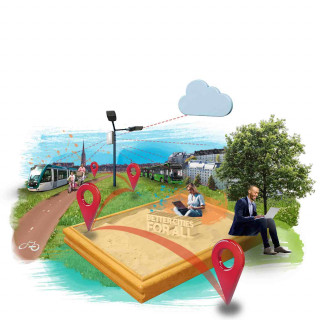How can European cities and regions use “sandboxing” methodologies to develop their data ecosystems? This is the central question explored in the project: "Regional and local data-driven
innovation through collective intelligence and sandboxing”.
The purpose of the project is to support the Joint Research Centre (JRC) in identifying and assessing the impact of the development of regional and local data ecosystems on policy and data-driven public sector innovation.
The project has analyzed existing data ecosystems at local and regional level and has supported the cities of Barcelona, Helsinki, Milan and Poznan in experimenting with different sandboxing approaches, aiming to strengthen their data ecosystems, and draw policy lessons for data-driven innovation.
Defining "Sandboxing"
In the context of this project, “sandboxing” refers to testing solutions in a safe environment, with a focus on technical and organizational innovations to enable more efficient and effective delivery of public services through data sharing and reuse. As a result of ongoing interaction with cities, we learnt that it is helpful to differentiate between three types of sandboxing:
- Technical sandboxing: This refers to the process of safely developing and testing new applications before operationalising them. Within the project, technical sandboxing focused on enabling more visualization and analytics tools, as different data sources were combined.
- Traditional (technical) sandboxing: Traditionally, new applications are developed and tested in an isolated technical environment or sandbox before incorporating them into the operating environment. This continues to be a well-used and effective mechanism. There are, however, other options that allow development and testing to take place in a carefully managed way within an operating environment.
- Institutional sandboxing: While the sandbox is primarily a technical environment, the main barriers to developing and producing value in data ecosystems are non-technical. Institutional sandboxing refers to activities aimed at developing and testing solutions to these institutional barriers. Within the project, the institutional sandboxing focused on best practices and policies for Business to Government (B2G) data sharing, such as
incentives, contracts and partnerships to acquire private sector data.
Validation Survey
To better understand the experience from other European cities and their stakeholders in using sandboxing to improve data-driven innovation, the project team invites all stakeholders to share their experience with using sandboxing activities to develop data ecosystem via our short Validation Survey which should only take 10-15 min to complete: https://us02web.zoom.us/meeting/register/tZcucuuprDIvH9z1j6XP-fMtM6dxgYuySWaX
Validation Workshop
All interested stakeholders are also invited to participate in a Validation Workshop on April 28, 14:00-16:00 CET, where the project team will present and validate the key findings from the project which focus on challenges and best practices in implementing sandboxing to develop data ecosystems.
The agenda for the workshop will be communicate shortly. Registration is possible via the following link:
https://us02web.zoom.us/meeting/register/tZcucuuprDIvH9z1j6XP-fMtM6dxgYuySWaX





